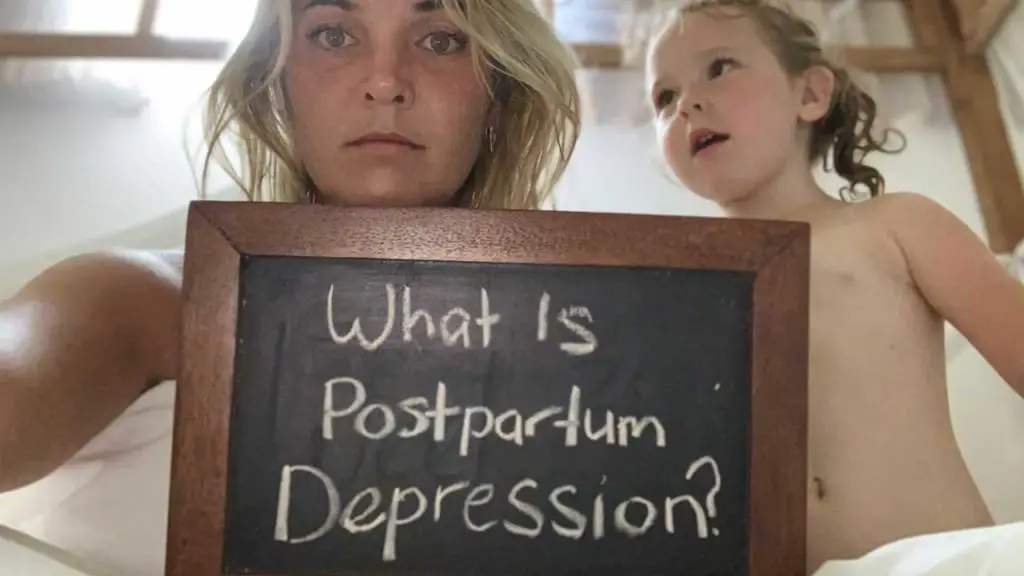
Subscribe to our YouTube Channel
Dealing with postpartum depression should not be done alone. The ultimate guide on how to manage postpartum depression is here for you. It’s not going to be easy, but having someone you can relate to is step one in conquering the battle of postpartum depression.
The most effective way on how to manage postpartum depression is to reach out to your healthcare provider and get to know what it is all about. They will conduct a series of tests to evaluate your state. The flow of the treatment will depend on the results of the trials and evaluations run by your doctor.
Postpartum depression is not a source of shame. It is treatable and manageable. You will bounce back and feel better. Educate yourself about the causes, signs to look out for, as well as what you and your partner can do to overcome postpartum depression.
Table of Contents
What is Postpartum Depression?
For most moms, pregnancy and childbirth journey is a rollercoaster ride. You’ve felt a wild variety of emotions, from excitement to fear and joy to sadness.
Postpartum depression is a mental illness that affects moms after childbirth. It can cause emotional, physical, and behavioural changes. Typically, most women start having mood swings or ‘baby blues’, hours after they gave birth.
I remember feeling happy at a time when all of a sudden I ended up crying and frustrated. I even lost my appetite, and I find it hard to concentrate during that time. Amazingly, those still qualify as baby blues. People told me that it is normal and it is our body’s way of adjusting to hormonal changes brought about by recent childbirth.
Baby blues usually go away on its own ten days after delivery. But if feelings of exhaustion, anxiety, loneliness, and frustration, intensify and last longer than the usual, it is postpartum depression. Most women will feel like they are not doing good in taking care of their baby. They feel worthless and hopeless.
I remember crying over a diaper poop. I remember being resentful towards my husband when he goes out for a basketball game as I end up alone to take care of the baby. I recall how I doubted my motherhood skills every single day. It was miserable, I felt alone, and I’m struggling.
But I tried to hide it all and pretend I’m doing okay.
Why?
Because there is a stigma in society regarding depression. People don’t have the chance to talk about postpartum depression honestly. Men can also suffer from postpartum depression and yet, they don’t get the chance to talk about it openly.
For almost a year, I suffered in silence before I decided to reach out and ask for help. I was too shamefaced to admit that I have a problem. I’m also worried about receiving my diagnosis and criticism from others. I realised, no woman should feel that way. No woman should feel miserable and deal with postpartum depression alone.
If you are silently suffering right now, know that we are here for you and that there are a lot of ways on how to manage postpartum depression.
Causes of Postpartum Depression
No one knows the root cause of postpartum depression, but emotional and physical issues are the two significant factors to consider. Another factor to consider is hormones. They play a substantial role during pregnancy and childbirth. During that time, our brain has undergone multiple chemical changes brought about the hormonal changes in our body. It could cause our mind to go haywire causing depression.
Here are some possible reasons why postpartum depression occurs:
- Sudden physical changes brought about by childbirth
- Hormonal imbalance after giving birth
- Sleep deprivation
- Emotional issues and inability to openly express emotions
- Struggling with self-identity
- Feeling you’ve lost control of your life
- Feeling less attractive
- Underlying depression even before pregnancy
- A very stressful marriage or relationship
- Stressful life events during pregnancy and childbirth such as a death in the family while pregnant or difficult childbirth delivery
Remember that causes may vary in every woman. Postpartum depression is not a personality defect or imperfection. It is part of your pregnancy and childbirth journey. It is also one of the various complications that can happen after you deliver your baby.
Signs Of Postpartum Depression
Symptoms of postpartum depression are persistent and existing for two or more weeks. Most women with postnatal depression will start having symptoms within the first month after childbirth, but they can have these signs as early as during pregnancy. It can also occur and develop in the next 12 months after birth.
Signs will differ from woman to woman, and it will present in different forms and severity. Some mistake baby blues as postpartum depression. Here’s a comparison:
It is “baby blues” when:
- You have mood swings. You are happy then all of a sudden, you are sad. Your mood swings fast from one emotion to another.
- You are anxious. You are proud of being a mother, and you acknowledge yourself of doing a great job. Then, you saw a diaper rash and all of a sudden you’re crying because you suddenly have doubts.
- You have appetite problems. You don’t have the desire to eat because of too much exhaustion.
- You are irritable. You get annoyed easily, even in the smallest things. Women who had baby blues are usually upset with their partners.
- You feel overwhelmed. You’re used to living your life alone then all of a sudden you have to sleep late, wake up early, change diapers, and stick your boob out to feed a tiny human being.
- You cry. Exhaustion, lack of sleep, and overwhelming baby-related chores can cause you to bawl at some point. When your baby is continuously crying and you don’t know what else to do, you’ll end up crying too. As hilarious as it may sound, your baby will somehow take the hint and will stop wailing. Then, you’ll end up crying more.
It is postpartum depression when:
- You have severe mood swings. You feel sad, hopeless, worthless, alone, and miserable all the time.
- You cry excessively. No matter what you do, you feel down and can’t stop crying. You can’t hold back your tears even when you are at a grocery store.
- You do not bond with your baby. At first, you’ll start by having difficulties bonding with your baby. You can’t feel any emotion toward him/her. Then, you’ll begin to blame your baby for all the hardships that you are going through.
- You back away from friends and family. You lost the interest to socialise and talk with anyone. You feel like they don’t understand what you are going through and you partly blame them for everything.
- You feel hunger pangs or loss of appetite. You completely lose the desire to eat, or you are overeating.
More Signs…
- You sleep too much or not at all. Insomnia is a usual thing for women who had childbirth recently. But if you can’t doze at all no matter how tired you are, it’s a sign of postpartum depression. On the other hand, waking up tired and sleeping too much is also an indicator of postnatal depression.
- You feel too much exhaustion and fatigue. Even if you had a good night sleep or you just had a lovely meal, you still feel so tired that you can’t even get up and do daily routines. If the exhaustion is affecting the way you function every day, it is a clear sign of postpartum depression. If you are at this point, please reach out and ask help. Support systems will play a huge role in how to manage postpartum depression.
- You fear you are the worst mother. No matter what you do, you can’t elude the thought that you are not doing a great job. You feel like you are a good-for-nothing, useless mom, causing you always to feel guilty and ashamed of yourself.
- You think of harming yourself and your baby. This one is a severe sign that you’re suffering from postpartum depression. You can’t think straight anymore, and you want to put an end to your miserable situation.
- You have severe panic attacks. Too much anxiety and stress can trigger severe panic attacks. These attacks will prevent you from functioning properly.
You can easily overlook the symptoms of postpartum depression.
It can easily be mistaken for another condition. Most women will choose to hide what they are going through because they are afraid to be stigmatised and judged for not being a good mom.
Postpartum depression will last for many months if it is left untreated. It is essential to reach out to everyone when you feel that something is not healthy. Admitting and recognising that you have an issue is the first step on how to manage postpartum depression.
What Can Happen to Moms with Postpartum Depression?
Postpartum depression usually affects women who recently gave birth. But it can also affect women who recently adopted a child. Surprisingly, our husband can experience it too. There’s no way we can avoid postpartum depression completely. We don’t have full control over it because hormones and chemicals in our brain are involved too.
So what can happen if you have postpartum depression?
Most of the time women feel lost. They feel anxious all the time. I remember feeling worried every day. My mind is exhausted from restless thoughts, and I always anticipate that something wrong will happen. At first, my lack of sleep comes from the fear that something might happen with the baby while I’m asleep. I could not even take a decent nap throughout the day, and I also don’t want the night to come. You’ll start to feel that you are alone and it will feel like you are not yourself anymore.
At around this time, most women knew that they have postpartum depression. But all of them will be in denial. Moms with postpartum depression tend to hide what they are going through, and husbands will be clueless as to why their wives are falling apart.
Postpartum depression can change you inside and out. If you’re a vibrant, happy go lucky type of person, it can make you a quiet and reserved person in just a snap. Physical changes will manifest too. Dark circles around the eyes from not having enough sleep will be present, your skin will start to dry because of too much stress, and you will begin to feel body aches.
My doctor used to say that emotional pain can sometimes manifest as physical pain. When we overthink, it causes us to worry.
When we fret, we feel guilty and ashamed.
It brings too much stress in our brain causing severe headaches in women who have postpartum depression.
Most moms did not notice that they are slowly drifting away from their husbands. When you have postpartum depression, you stop expressing yourself to anyone. Having sex feels like a chore to you. Talking with him is annoying because you think that he of all people, should know what is going on with you. Please understand that he does not know. He does not have a clue of what’s going inside you and also stresses over the fact that you are slowly changing and falling apart.
Physical and emotional changes can happen to anyone who is experiencing postpartum depression. It will change your thinking, and perspective on life. You won’t be able to make a sound decision because most of the time you won’t be able to concentrate.
Luckily, some women who overcome it choose not to remain silent about it. People are coming out, sharing their stories, and helping other moms that are suffering at the moment. If you are hurting right now, please know that we at The Parenting Co will help you on how to manage your postpartum depression from start to finish.
Postpartum Depression Effects on Children
For most moms, the consequences brought by postpartum depression is hard to manage. Unfortunately, it can also be hard for your baby.
You won’t be able to take care of your baby adequately if you are suffering from postpartum depression. It will significantly impact your baby’s development.
Here are some of the effects on your baby:
Increased Stress Level
Postpartum depression can change you physically and emotionally. Your baby, on the other hand, reacts with fear when they encounter something new. It is your baby’s survival instinct. Fear produced cortisols, which are also known as stress hormones.
Our babies rely heavily on us during the first 12 months of their lives. Moms who are feeling comfortable with their environment, and with other people, as well as their ability to sense what their baby wants, are teaching their babies to trust the people around him/her. Your baby will feel like they are safe.
On the other hand, a depressed mom who is not happy and comfortable with her life is causing her baby to feel stress at an early age. Moreover, your baby will develop a fearful attitude.
Low IQ
There have been studies that show the link between baby’s low IQ and postpartum depression. Toddlers whose mom has postpartum depression have problems in socialising causing increase problems both at home and at school.
Low Social Engagement
Children of depressed mothers will have social interactions problem. As early as the age of 3, they will feel anxiety and worthlessness. They will have a hard time trusting others and making friends. Believe it or not, babies can sense if something is wrong with their moms. They sense if mom is happy, sad, relaxed, or afraid. We usually take things for granted because we always thought that they are still small and has no understanding of the world. We are wrong. They can feel it. They will sense if you suddenly lost interest in cuddling him/her. They know that you get annoyed when they cried.
That is the number one reason that should push each mom to come out and have a proper course of treatment. Realising that it could also affect your baby is one way on how to manage postpartum depression.
How to Manage Postpartum Depression?
Suffering from any forms of depression does not make you less of a person. Postpartum depression is not something you “did” to yourself or “brought” to yourself. Acknowledging that you have a problem and asking help for it are effective ways on how to manage postpartum depression.
Let’s face it. It will not be easy. Coping with postpartum depression does not necessarily mean taking antidepressants and going to therapy sessions. We may need to take baby steps if we need to. There’s no right and wrong in coping with postpartum depression. The important thing is, you are willing to do it.
Here are some ways you can manage postpartum depression:
- Talk to someone you trust and openly talk about your feelings. Talk at your own pace; there’s no need to rush and talk about it all at once.
- Find and build your support network. Slowly open yourself; reconnect with friends and family. Let them help with childcare and household chores. Focus on getting some rest and recover.
- Do something that you love. Rediscover yourself slowly. Find something that sparks your attention. Read a book, engage in sports, listen to music, or learn a new hobby. Fall in love with yourself again.
- Get yourself a journal. You will not be able to tell everyone, everything. If that’s the problem, then write everything down. Let go of your frustrations by writing it out. Keep track of your mini success. And when you are all better, reread your journal, look back and appreciate how far you’ve come.
More Ways…
- Bond with your baby. Remind yourself how long you’ve waited to hold this little human in your arms finally. Held your baby close to your heart, skin to skin contact is beneficial for both you and your baby. Read books to your baby, sing, and smile often. Your baby is also supporting you in this journey.
- Take care of yourself. Have a manicure or pedicure, buy new clothes, have a massage, and put on some makeup. Look good and feel good again. Get out in the sunshine, and pamper yourself. You deserve it!
- Exercise when you can. Exercising is healthy for the brain. It triggers the brain to produce happy hormones that will help balance chemicals in there. It does not need to be a long session. Try exercising ten minutes a day, sex and pushing that stroller counts!
- Visit your doctor and openly talk about it. Find a doctor that you can trust. Openly talk about your feelings, and your struggles. Ask questions. Your doctor will evaluate your condition and might prescribe medication. No matter how hard it is, don’t lie on the tests. Accurate tests results play a substantial role in how to manage postpartum depression.
Suffering from depression is nobody’s fault. Ask help as soon as possible, and you’ll get to manage and cope with postpartum depression early. The sooner you become better, the sooner you can enjoy motherhood again.
For Husbands: How To Help Your Spouse With Postpartum Depression
All men will agree that women are difficult to understand to begin with. But things get painful when you live with someone who has postpartum depression. It is sad and frustrating to see your lovely spouse slowly falling apart. You will become obsessed with finding out what’s wrong and you will try everything to fix it up.
What you do might help, or might not. It’s also possible that it can make things worst. Go easy on yourself; there’s no way that you can fix this. It does not go away quickly, it takes a lot of patience and planning to help your wife to cope with postpartum depression.
No matter what you do, DO NOT ASSUME. Don’t get ahead of what’s going on with your wife’s mind. Here are some postpartum depression facts you need to know:
- Research has shown that women who enjoy their husband’s support while having postpartum depression are recovering faster than those who don’t.
- Your denial about postpartum depression will add up to the list of worries she has now. It will make her anxiety worse. Show her that there’s nothing wrong in admitting that you have a problem.
- Don’t expect too much from your wife. Even if you don’t intend to, expecting too much – demands too much. The more you demand something from her, the longer her recovery will be.
- Go easy on yourself. It is not your fault nor anybody’s. Putting pressure to yourself will only make things worst.
- Your wife will recover from postpartum depression. She will get better soon. Your home will be in harmony again.
Prepare yourself to be misunderstood multiple times. Her emotions are vulnerable at the moment, and she may not appreciate what you are trying to say.
She may interpret it this way:
- If you tell her how much you love her, she will not believe you.
- If you remind and tell her that she is a good mother, she will think you are patronising her, that you are only saying that to make her feel better.
- If you tell her how beautiful she is, she will think that you are lying.
- If you tell her that there’s no need to worry about everything, she will think that you can’t understand her and you have no idea how bad she feels.
- If you tell her you’ll adjust and come home early to help her, she will feel useless and guilty.
- If you tell her you that you’ll come late because you need to work late, she will think she’s worthless and you don’t care.
But you can do the following:
- Acknowledge her struggle and tell her that you know that she feels horrible.
- Give her assurance and tell her that she will bounce back from this and that she will feel better.
- Celebrate her small wins. Appreciate her effort in trying to get better. Tell her she’s doing the right thing, taking her meds, engaging into a hobby, or talking to her doctor.
- Tell her that there’s no way motherhood can be perfect. Assure her that she can be a good mother even if she feels terrible.
- Remind her that nobody in this world is perfect. Tell her that it is okay to have mistakes and motherhood is not all about perfection.
- Appreciate her hard work in trying to cope with postpartum depression.
- Remind her that she can come to you if she needs help.
- Tell her that you know she’s putting a lot of effort to be better and you know that she’s doing her best.
- Tell her you love her and that will never change just because she felt terrible about herself.
- Assure her that your baby will be alright and that she’s doing everything she can to nurture and grow your baby. Tell her it is enough and she is enough.
Here’s what NOT to say:
- Do not advise her that she SHOULD ‘get over it’.
- Do not tell her that you are TIRED of understanding her feelings.
- Do not tell her that she should be celebrating the HAPPIEST TIME of her life.
- Do not, under any circumstances, express that YOU LIKED THE OLDER VERSION OF HER.
- Do not tell her that she BREAK OUT OF IT.
- Do not tell her she would feel better if only she’s not doing what she is doing right now.
- Do not advise her that she SHOULD lose weight.
- Do not get ahead and tell her that this is JUST A PHASE.
- Do not tell her that postpartum depression comes with having a baby.
- Do not tell her that she’s strong enough to go through this alone.
What can you do to help her out?
- Help with household chores.
- Protect her from nosy friends and family. Set limits if you need to.
- Take a message for her, answer the urgent calls.
- Do the laundry. Cook or order take out. Be in charge of the kitchen, for now.
- Be with her during doctor’s appointment.
- Educate yourself about depression and help her on how to manage postpartum depression.
- List it down questions, clarifications, and ask her doctor about it.
- Together, make a list of things that can relieve her stress if she needs to.
- Just be with her—no TV, no newspaper, no cellphone, only you and her. It will be hard at first especially if she’s very sad and frustrated. Sit in silence with her for 5 minutes every day. No need to talk, she needs someone to be there when all she felt alone.
- Look into her eyes when she talks to you.
Here are a few things you need to remember:
- Do not make any crucial decisions until after she feels better.
- If there’s any matter that should be decided and can’t wait, involve her in the decision making.
- Decisions about breastfeeding, children, work, and others will be overwhelming for her now. Help her sort these things out by letting her know the pros and cons.
- Some of the things that she enjoys before can be stressful for her now. Do not force any activity to her. Let her rediscover herself and give her space to try out new things she might like.
Postpartum depression can affect the entire family. Help the love of your life and look after the baby. Reach out to friends and family if you need additional help. Remember that you can aid in her recovery. Be strong, Daddy!
Can Postpartum Depression be Avoided and Prevented?
Postpartum depression cannot be avoided and prevented. But, if you have a previous history of having postpartum depression with your other kids, you can at least get ready and prepare. Prepare and gear up your body. Make sure to eat highly nutritious food and maintain an active lifestyle. Continue having a healthy lifestyle, even after your baby is born. Inform your doctor about your concerns regarding postpartum depression.
Could My Husband Have Postpartum Depression?
Yes, first-time fathers can have postpartum depression too. They will feel sad, overwhelmed, and frustrated also. Their appetite and sleep patterns might be affected as well. Overall, they will have the same symptoms of mothers with postpartum depression experience.
Fathers who are young, financially struggling, and have a history of depression are prone to having postpartum depression. If your husband is showing symptoms of postpartum depression, or anxiety reaches out and talk to your doctor about it. Support him in the same way you would want to if you are in his situation.
Remember that people with depression will not be able to recognise or admit that they have a problem. They may not be aware of the signs and symptoms, or they are in complete denial. If you have a feeling that someone has postpartum depression or if you have postpartum depression, help them, help yourself and seek out help immediately.
Postpartum depression is not something to be ashamed of.






